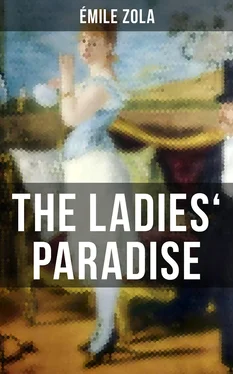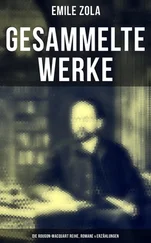“Thank heaven!” said the draper in conclusion, “if the father drinks and runs after the women, the son has learnt the value of money here.”
Whilst he was speaking Denise was examining Geneviève and Colomban. They sat close together at table, but remained very quiet, without a blush or a smile. From the day of his entry the young man had counted on this marriage. He had passed through the various stages: junior, counter-hand, etc., and had at last gained admittance into the confidence and pleasures of the family circle, all this patiently, and leading a clock-work style of life, looking upon this marriage with Geneviève as an excellent, convenient arrangement. The certainty of having her prevented him feeling any desire for her. And the young girl had also got to love him, but with the gravity of her reserved nature, and a real deep passion of which she herself was not aware, in her regular, monotonous daily life.
“Quite right, if they like each other, and can do it,” said Denise, smiling, considering it her duty to make herself agreeable.
“Yes, it always finishes like that,” declared Colomban, who had not spoken a word before, masticating slowly.
Geneviève, after giving him a long look, said in her turn: “When people understand each other, the rest comes naturally.”
Their tenderness had sprung up in this gloomy house of old Paris like a flower in a cellar. For ten years she had known no one but him, living by his side, behind the same bales of cloth, amidst the darkness of the shop; morning and evening they found themselves elbow to elbow in the narrow dining room, so damp and dull. They could not have been more concealed, more utterly lost had they been in the country, in the woods. But a doubt, a jealous fear, began to suggest itself to the young girl, that she had given her hand, forever, amidst this abetting solitude through sheer emptiness of heart and mental weariness.
However, Denise, having remarked a growing anxiety in the look Geneviève cast at Colomban, good-naturedly replied: “Oh! when people are in love they always understand each other.”
But Baudu kept a sharp eye on the table. He had distributed slices of Brie cheese, and, as a treat for the visitors, he called for a second dessert, a pot of red-currant jam, a liberality which seemed to surprise Colomban. Pépé, who up to then had been very good, behaved rather badly at the sight of the jam; whilst Jean, all attention during the conversation about Geneviève’s marriage, was taking stock of the latter, whom he thought too weak, too pale, comparing her in his own mind to a little white rabbit with black ears and pink eyes.
“We’ve chatted enough, and must now make room for the others,” said the draper, giving the signal to rise from table. “Just because we’ve had a treat is no reason why we should want too much of it.”
Madame Baudu, the other shopman, and the young lady then came and took their places at the table. Denise, left alone again, sat near the door waiting for her uncle to take her to Vinçard’s. Pépé was playing at her feet, whilst Jean had resumed his post of observation at the door. She sat there for nearly an hour, taking an interest in what was going on around her. Now and again a few customers came in; a lady, then two others appeared, the shop retaining its musty odor, its half light, by which the old-fashioned business, good-natured and simple, seemed to be weeping at its desertion. But what most interested Denise was The Ladies’ Paradise opposite, the windows of which she could see through the open door. The sky remained clouded, a sort of humid softness warmed the air, notwithstanding the season; and in this clear light, in which there was, as it were, a hazy diffusion of sunshine, the great shop seemed alive and in full activity.
Denise began to feel as if she were watching a machine working at full pressure, communicating its movement even as far as the windows. They were no longer the cold windows she had seen in the early morning; they seemed to be warm and vibrating from the activity within. There was a crowd before them, groups of women pushing and squeezing, devouring the finery with longing, covetous eyes. And the stuffs became animated in this passionate atmosphere: the laces fluttered, drooped, and concealed the depths of the shop with a troubling air of mystery; even the lengths of cloth, thick and heavy, exhaled a tempting odor, while the cloaks threw out their folds over the dummies, which assumed a soul, and the great velvet mantle particularly, expanded, supple and warm, as if on real fleshly shoulders, with a heaving of the bosom and a trembling of the hips. But the furnace-like glow which the house exhaled came above all from the sale, the crush at the counters, that could be felt behind the walls. There was the continual roaring of the machine at work, the marshalling of the customers, bewildered amidst the piles of goods, and finally pushed along to the paydesk. And all that went on in an orderly manner, with mechanical regularity, quite a nation of women passing through the force and logic of this wonderful commercial machine.
Denise had felt herself being tempted all day. She was bewildered and attracted by this shop, to her so vast, in which she saw more people in an hour than she had seen at Cornaille’s in six months; and there was mingled with her desire to enter it a vague sense of danger which rendered the seduction complete. At the same time her uncle’s shop made her feel ill at ease; she felt an unreasonable disdain, an instinctive repugnance for this cold, icy place, the home of old-fashioned trading. All her sensations—her anxious entry, her friends’ cold reception, the dull lunch eaten in a prison-like atmosphere, her waiting amidst the sleepy solitude of this old house doomed to a speedy decay—all these sensations reproduced themselves in her mind under the form of a dumb protestation, a passionate longing for life and light. And notwithstanding her really tender heart, her eyes turned to The Ladies’ Paradise, as if the saleswoman within her felt the need to go and warm herself at the glow of this immense business.
“Plenty of customers over there!” was the remark that escaped her.
But she regretted her words on seeing the Baudus near her. Madame Baudu, who had finished her lunch, was standing up, quite white, with her pale eyes fixed on the monster; every time she caught sight of this place, a mute, blank despair swelled her heart, and filled her eyes with scalding tears. As for Geneviève, she was anxiously watching Colomban, who, not supposing he was being observed, stood in ecstasy, looking at the handsome young saleswomen in the dress department opposite, the counter being visible through the first floor window. Baudu, his anger rising, merely said:
“All is not gold that glitters. Patience!”
The thought of his family evidently kept back the flood of rancor which was rising in his throat. A feeling of pride prevented him displaying his temper before these children, only that morning arrived. At last the draper made an effort, and tore himself away from the spectacle of the sale opposite.
“Well!” resumed he, “we’ll go and see Vinçard. These situations are soon snatched up; it might be too late tomorrow.”
But before going out he ordered the junior to go to the station and fetch Denise’s box. Madame Baudu, to whom the young girl had confided Pépé, decided to run over and see Madame Gras, to arrange about the child. Jean promised his sister not to stir from the shop.
“It’s two minutes’ walk,” explained Baudu as they went down the Rue Gaillon; “Vinçard has a silk business, and still does a fair trade. Of course he suffers, like everyone else, but he’s an artful fellow, who makes both ends meet by his miserly ways. I fancy, though, he wants to retire, on account of his rheumatics.”
Читать дальше












